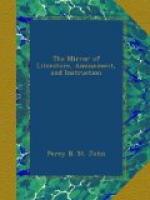* * * * *
THE OPERA.
Rousseau defines the opera to be a dramatic, lyrical, and scenic representation, in which agreeable sensations are conveyed by the combined effect of all the fine arts, the poetry and action being addressed to the mind, the music to the ear, and the scenic decorations to the eye of the spectator.
* * * * *
PICTURESQUE DRESSES IN SPANISH MARKETS.
On entering Madrid by the gate of Toledo, or the Place de la Cenada, where the market is held, nothing is more striking than the confused mass of people from the country and provinces. There a Castilian draws around him with dignity the folds of his ample cloak, like a Roman senator in his toga. Here a cowherd from La Mancha, with his long goad in his hand, clad in a kilt of ox-skin, whose antique shape bears some resemblance to the tunic worn by the Roman and Gothic warriors. Farther on may be seen men with their hair confined in long nets of silk. Others wearing a kind of short brown vest, striped with blue and red, conveying the idea of Moorish garb. The men who wear this dress come from Andalusia.
* * * * *
HYMN.
I praised the earth, in beauty seen,
With garlands gay of various green;
I praised the sea, whose ample field
Shone glorious as a silver shield,
And earth and ocean seemed to say,
“Our beauties are but for a day.”
I praised the sun, whose chariot roll’d
On wheels of amber and of gold;
I praised the moon, whose softer eye
Gleamed sweetly through the summer sky;
And moon and sun in answer said,
“Our days of light are numbered.”
Oh God, oh good beyond compare!
If thus thy meaner works are fair!
If thus thy bounties gild the span
Of ruined earth, and sinful man;
How glorious must the mansion be
Where thy redeem’d shall dwell with
thee!
* * * * *
MECHANICAL TRIUMPHS.
To those interested in the mechanical sciences, and their application to manufactures and the arts, England offers larger scope of observation than any other country in the world. Throughout the vast establishments of our cotton, woollen, linen, silk, and hardware manufactures, there is even less to create astonishment in the multitude and variety of the products, than in the exquisite perfection of the machinery employed—machinery, such in kind, that it seems almost to usurp the functions of human intelligence. No one can conceive its completeness, who has not witnessed the workings of the power-loom, or seen the mechanism by which the brute power of steam is made to effect the most minute and delicate processes of tambouring. Nor can




